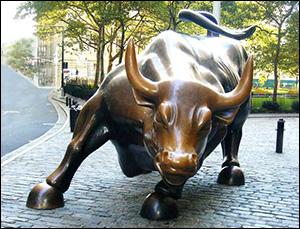Courtesy of Pam Martens.
 Yesterday the Wall Street Journal gave prominence to the following headline on page one of its newspaper with the story jumping to page A2: “Bad Market Timing Fueled Wealth Gap.” Through the use of the word “fueled” in that headline, the reader is conditioned to believe that market timing is a significant cause of wealth inequality in the United States – a completely bogus idea for which there exists mountains of research to the contrary.
Yesterday the Wall Street Journal gave prominence to the following headline on page one of its newspaper with the story jumping to page A2: “Bad Market Timing Fueled Wealth Gap.” Through the use of the word “fueled” in that headline, the reader is conditioned to believe that market timing is a significant cause of wealth inequality in the United States – a completely bogus idea for which there exists mountains of research to the contrary.
The online version of the article includes a video interview with the author, Josh Zumbrun, and this caption appears under the video: “Millions of Americans bought high and sold low, which caused them to unknowingly widen economic inequality. WSJ’s Josh Zumbrun explains on MoneyBeat with Paul Vigna.”
The crux of this thesis is built in the first three paragraphs of the article as follows:
“Millions of Americans inadvertently made a classic investment mistake that contributed to today’s widening economic inequality: They bought high and sold low.
“Late in the stock-market booms of the 1990s and 2000s, more U.S. families clambered into stocks as indexes surged. Then, once markets tumbled, many households sold and took losses.
“Those that held on during the most recent collapses reaped the benefits as stocks nearly tripled between 2009 and today.”
Only much later in the article does the author offer up this bit of clarification:
“Wealth inequality in the U.S. has many causes, some of which precede the recent booms and busts, and the new research doesn’t quantify exactly how much the stock-market timing contributed to it.”
“Doesn’t quantify exactly how much”? But your front page headline said market timing “fueled” the wealth gap. The Wall Street Journal couldn’t possibly be engaging in propaganda could it?
The absurdity that buying high and selling low fueled wealth inequality in the United States is firmly established in the data from decades of the Federal Reserve’s Survey of Consumer Finances (SCF) indicating that the vast majority of American households don’t even own stocks. According to the 2007 SCF, the year before the 2008 financial crash, only 17.9 percent of American households owned stocks.



